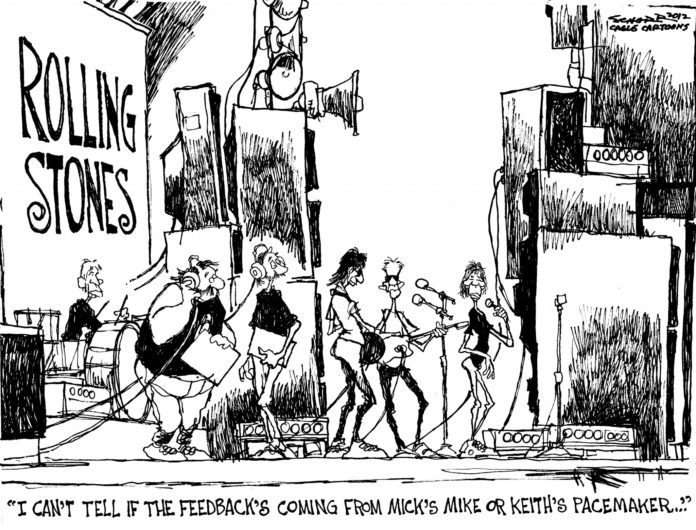BY RICHARD L. FRICKER
 One Los Angles night in the fall of 1969, a 21-year-old woman clad in a mink coat, house gown and slippers was called in the middle of the night to meet a group of men from England whom she didn’t know. By the time the meeting was over she had shouted “Rape! Murder!” several times.
One Los Angles night in the fall of 1969, a 21-year-old woman clad in a mink coat, house gown and slippers was called in the middle of the night to meet a group of men from England whom she didn’t know. By the time the meeting was over she had shouted “Rape! Murder!” several times.
As she belted out those words Merry Clayton walked herself and the Rolling Stones into cultural and rock n’ roll history.
Clayton, with Stones’ Mick Jagger on vocals, had just finished laying down the track for Gemmie Shelter. The lines, “Rape, Murder, it’s just a shot away, it’s just a shot away” helped a generation racked by the Vietnam War, civil rights movement and Richard Nixon’s War on Drugs define itself and its dangers, real and imagined.
This is only one of the moments in modern music history recounted in Morgan Neville’s documentary 20 Feet From Stardom. This 90-minute tour de force profiles many of the backup singers without whom post-World War II music would, quite frankly, not be the music we know today.
As the title suggests, the backup singer is 20 feet from the star of the show. But as the interviews and sound clips suggest, without them there would be no show.
Using a documentary format, Neville has blended various styles and generations of music, interviews, personalities and social history into a single storyline. And while taking the audience on this decades-long journey, he introduces singers who, although not necessarily household names, are giants within their industry, often times verging, if not de facto, national treasures.
The journey begins with The Blossoms, one of the first all-black singing groups to break into mainstream rock n’ roll radio. The year was 1954. In addition to releasing their own singles on a number of labels, the group sang backup for a number of white and black artists.
By 1958 The Blossoms had made some personnel changes, the most significant of which was the addition of Darlene Wright. Their producer, Phil Spector, would change her name to Darlene Love, homage to gospel singer Dorothy Love-Coates.
It wasn’t just The Blossoms that were changing. A new generation was emerging bringing changes to the social landscape that would be reflected in their plays, music and performance.
The days of the slick musical, mostly white, background singer used by Perry Como, Frank Sinatra and others of the post-war era was fading. The new generation wanted something more edgy, more earth tone, something from the street and the people who walked those streets.
In 1956 British writer John Osborne premiered his play Look Back in Anger which gave rise to the new generation as “angry young men.” In America this translated, because of a line in the play, to “rebel without a cause.”
The new generation found its voice in the background singer, the black background singer, who perhaps not classically trained could reach out with voice trained in church. This voice would blend with what would become a dis-satisfied generation that wanted not only to be heard but wanted change.
Not surprising, the first hit for Love and the Blossoms was the Spector produced He’s a Rebel in 1962. The backup singer had arrived, not just to sing backup, but also to be part of the overall production.
Many of these singers, and the artists they backed, appeared at one time or another on the ABC show Shindig. The show was first aired in September 1964 and ran until January 1966.
During those 14 months, virtually anyone who was anyone or would become anyone appeared on Shindig. Notably, one of the stalwarts of the house band was Leon Russell.
In addition to Clayton and Love, the film re-introduces such dynamics as Lisa Fischer, Tata Vega, the Waters Family [Oren, Maxine and Julia], Claudia Lennear, Jo Lawry and several others.
Fischer shows a versatility seldom found in the human voice. It is enough to say that even when watching videos of her sessions with Sting or clips of tours with the Stones she is mesmerizing.
Fischer has been a part of every Stones tour since 1989. Her adaptation of Clayton’s Gimmie Shelter has become a mainstay of the tour.
In addition to touring with the Stones, she also toured with Luther Vandross for 22 years until his death.
Vega has been a principal backup singer of Elton John and many others. She had a brief solo career – about which she muses, she would most likely be dead from excesses of drugs and lifestyle.
Lennear tells her story of tours with Jagger as one of his backup singers. She also talks about walking off from the music business to take up a career teaching foreign languages in California.
Lawry, backup for Sting, talks about not wanting to be a star. Sting talks about his singers as stars and says so directly to the camera.
Perhaps the most prolific of backup singers would be the Waters family. Siblings Oren, Julia and Maxine have sung on dozens of Grammy award albums, not to mention those that didn’t win Grammys.
The Waters also have an impressive list of film credits including Avatar and Lion King and too many others to mention.
Perhaps the youngest of the featured singers is Judith Hill. Her Japanese mother is a pianist from Tokyo; her father is African-American who met her mother while playing in a funk band in the 1970s.
Hill was tapped as the vocal partner for Michael Jackson. She was still rehearsing for his This is It tour at the time of his death in 2009.
Hill was to cross that 20 feet – and may well be on her way, according to recent reviews.
But, as Bruce Springsteen notes on screen, it is a very long walk.
There is an abundance of film clips from decades of shows with Ray Charles, The Rolling Stones, The Ike and Tina Turner Review, Luther Vandross and others spanning the decades. These women knew how to bring talent and sensuality to the stage without being vulgar or acting as if they just discovered the training bra.
One of the most impressive clips is the Sting rehearsal with Fisher, Lowery and Hill. Just watching these women, each a cutting edge professional in their own right, blend their voice into one unified sound is incredible.
Neville has done more than just present interviews and clips – he has given us an important part of the backstory to the music that saw this country through war and unrest, hope, disappointment and accomplishment. He has, in a unique way, told a part of our history that might otherwise have been missed.
– Richard L. Fricker lives in Tulsa, OK and is a regular contributor to The Oklahoma Observer. His latest book, The Last Day of the War, is available at https://www.createspace.com/3804081 or at www.richardfricker.com.









Finally something I can relate to….. as they say “those were the good ol days”
Great article, Richard! This is Dianna, Court Clerk’s Office in Creek County.
Wow… I never knew any of that, I am amazed and greatful to be able to know the significance of 20 feet away, as well as the role that back up singers had in our music history.
Wow… I never knew any of that I did now know the significance 20 feet away meant, and knowing what I know now about back up singers they have contributed so much to our music history.
People in the backround never recieve the recognition they deserve. This article shows exactly how important and crucial back up singers are and how they have impacted our history.